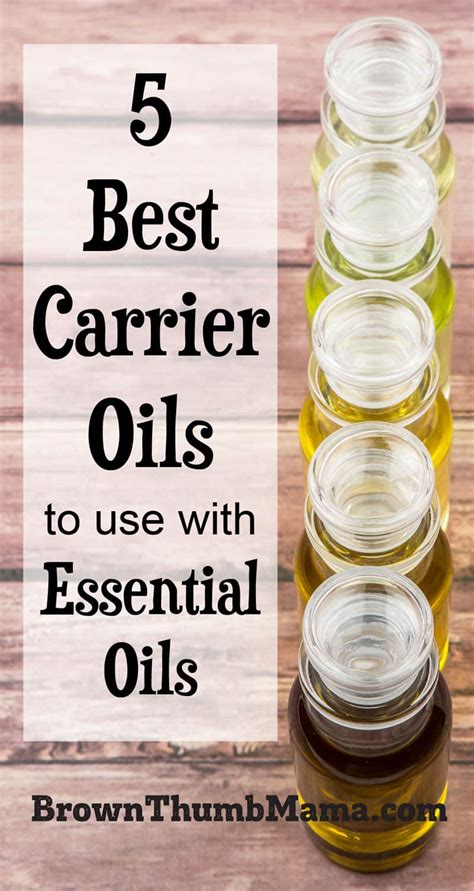Carrier oils are the base oils that are used to dilute essential oils before applying them to the skin. They are typically made from vegetable oils, such as jojoba oil, coconut oil, or almond oil. Carrier oils help to disperse the essential oils evenly over the skin and prevent them from being too concentrated. They also help to moisturize the skin and provide a barrier against irritants.

Benefits of Carrier Oils
There are many benefits to using carrier oils with essential oils, including:
- Moisturizing: Carrier oils help to keep the skin hydrated and prevent it from becoming dry and irritated.
- Soothing: Carrier oils can help to soothe the skin and reduce inflammation.
- Protective: Carrier oils create a barrier on the skin that helps to protect it from irritants and environmental pollutants.
- Dispersing: Carrier oils help to disperse essential oils evenly over the skin, preventing them from being too concentrated.
Common Carrier Oils
There are many different types of carrier oils available, each with its own unique benefits. Some of the most common carrier oils include:
- Jojoba oil: Jojoba oil is a light, non-greasy oil that is similar to the sebum produced by the skin. It is a good choice for all skin types, including sensitive skin.
- Coconut oil: Coconut oil is a thick, oily oil that is solid at room temperature. It is a good choice for dry skin and can help to soothe eczema and psoriasis.
- Almond oil: Almond oil is a light, nutty-smelling oil that is rich in vitamins A, E, and D. It is a good choice for all skin types, including sensitive skin.
- Grapeseed oil: Grapeseed oil is a light, non-greasy oil that is high in antioxidants. It is a good choice for oily skin and can help to reduce acne.
How to Use Carrier Oils
Carrier oils can be used in a variety of ways, including:
- Massage: Carrier oils can be used as a massage oil to help relax the muscles and relieve tension.
- Bathing: Carrier oils can be added to the bath to create a relaxing and moisturizing experience.
- Skin care: Carrier oils can be used as a moisturizer, cleanser, or makeup remover.
- Hair care: Carrier oils can be used as a hair conditioner or scalp treatment.
Common Mistakes to Avoid
There are a few common mistakes to avoid when using carrier oils:
- Using too much: Using too much carrier oil can make the skin greasy and clog the pores.
- Not diluting essential oils: Essential oils are very concentrated and can be irritating to the skin if they are not diluted with a carrier oil.
- Using the wrong carrier oil: Some carrier oils are not suitable for all skin types. For example, coconut oil can be too heavy for oily skin.
Carrier Oils for Specific Applications
Carrier oils can be used for a variety of specific applications, including:
- Dry skin: Jojoba oil, coconut oil, or almond oil are all good choices for dry skin.
- Oily skin: Grapeseed oil or jojoba oil are good choices for oily skin.
- Sensitive skin: Jojoba oil or almond oil are good choices for sensitive skin.
- Eczema: Coconut oil or almond oil can help to soothe eczema.
- Psoriasis: Coconut oil or jojoba oil can help to reduce the symptoms of psoriasis.
Pros and Cons of Carrier Oils
There are both pros and cons to using carrier oils with essential oils.
Pros:
- Carrier oils help to dilute essential oils and prevent them from being too concentrated.
- Carrier oils help to moisturize the skin and provide a barrier against irritants.
- Carrier oils can be used for a variety of applications, including massage, bathing, and skin care.
Cons:
- Using too much carrier oil can make the skin greasy and clog the pores.
- Not diluting essential oils with a carrier oil can be irritating to the skin.
- Some carrier oils are not suitable for all skin types.
Conclusion
Carrier oils are a versatile and beneficial addition to any essential oil routine. They can help to dilute essential oils, moisturize the skin, and provide a barrier against irritants. When choosing a carrier oil, it is important to consider your skin type and the specific application you are using it for.
Tables
Table 1: Common Carrier Oils
| Carrier Oil | Benefits |
|---|---|
| Jojoba oil | Light, non-greasy, similar to sebum |
| Coconut oil | Thick, oily, solid at room temperature, good for dry skin |
| Almond oil | Light, nutty-smelling, rich in vitamins A, E, and D |
| Grapeseed oil | Light, non-greasy, high in antioxidants |
Table 2: Carrier Oils for Specific Applications
| Application | Carrier Oil |
|---|---|
| Dry skin | Jojoba oil, coconut oil, almond oil |
| Oily skin | Grapeseed oil, jojoba oil |
| Sensitive skin | Jojoba oil, almond oil |
| Eczema | Coconut oil, almond oil |
| Psoriasis | Coconut oil, jojoba oil |
Table 3: Pros and Cons of Carrier Oils
| Pros | Cons |
|---|---|
| Dilute essential oils | Can make skin greasy |
| Moisturize skin | Not suitable for all skin types |
| Provide barrier against irritants | Can be irritating if not diluted |
Table 4: Creative New Word for Carrier Oils
| Creative New Word | Definition |
|---|---|
| Skinvestor | A carrier oil that enhances the benefits of essential oils and protects the skin |
